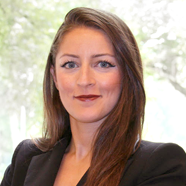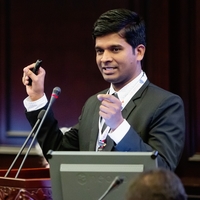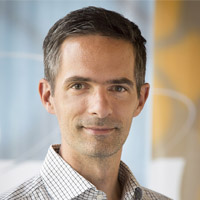Late Fall 2023
ONLINE
EdMedia + Innovate Learning Online Speakers 2022
Tuesday, November 1
Stephanie Akkaoui Hughes
Founding Director & Lead Architect, AKKA Architects, The Netherlands
Regenerative Innovation: How to Systematically Innovate Using Interactions
Abstract: “The misconception […] is the notion of ‘independent existence.’ There is no such mode of existence; every entity is to be understood in terms of the way it is interwoven with the rest of the universe.” Alfred Whitehead.
The global challenges we are facing today may not all be new. They are however of a magnitude and complexity we have never faced before. They are what we call interdependent problems. Interdependent problems can’t be solved in isolation; Instead we need to solve them in constellation. The knowledge needed to deal with global but also local development problems cannot originate from a single entity or a single discipline. Instead we need to shift from an approach of fragmented solutions to one of sustained innovation. Hughes believes that what she calls ‘sustained innovation’ calls for coordinated trans-disciplinary and trans-continental interactions. She defines Sustained innovation as a systematic approach to a process of innovation, that can sustain itself across time, meaning a sustained innovation. In her speech, Hughes will share the three principles and the four steps process we can all adopt now in order to shift from fragmented solutions to sustained innovation.
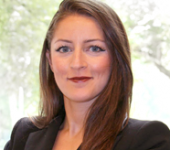 Bio: Born and raised in the tumultuous city of Beirut, Stephanie Akkaoui Hughes was awarded her professional degree in Architecture with high honours at the American University of Beirut. In 2007, she joined the world renowned Office for Metropolitan Architecture (OMA) where she spent 5 years practicing. During her time at OMA Stephanie built a deepened knowledge of the architecture profession leading major projects from design to completion; namely: the Qatar Foundation Headquarters, the Strategic Studies Center and the National Library of Qatar (http://www.qnl.qa).
Bio: Born and raised in the tumultuous city of Beirut, Stephanie Akkaoui Hughes was awarded her professional degree in Architecture with high honours at the American University of Beirut. In 2007, she joined the world renowned Office for Metropolitan Architecture (OMA) where she spent 5 years practicing. During her time at OMA Stephanie built a deepened knowledge of the architecture profession leading major projects from design to completion; namely: the Qatar Foundation Headquarters, the Strategic Studies Center and the National Library of Qatar (http://www.qnl.qa).
In 2012, driven by her vision to practice architecture differently than the mainstream custom, Stephanie founded AKKA Architects, an architecture studio based in Amsterdam, The Netherlands (www.akkaarchitects.com). AKKA Architects are driven by a vision called Architecting Interaction. Based on Stephanie’s belief that interactions are the seeds of innovation, Architecting Interaction explores how spaces can foster interactions and nurture values. AKKA Architects’ clients include The Royal Institute of the Tropics, Triodos Bank, Hitachi Energy, DHL, The Dutch Ministry of Infrastructure, and The European Commission, among others.
Beyond the world of architecture, Stephanie is often invited to speak and consult with a large number of varied audiences including social entrepreneurs, corporations, governmental, and educational bodies to share her vision of Architecting Interaction, and empower others to adapt it to their own specific situations. (https://www.akkaarchitects.com/stephanie-akkaoui-hughes-speaker-profile/). While it was developed for architecture, the vision and process of Architecting Interaction resonated with industries well beyond architecture because everyone can benefit from better interactions.
Wednesday, November 2
Solomon Arulraj David
The British University in Dubai
Epistemic Engagement in Higher Education: Implications for Curriculum and Instruction in Different Modes
Abstract: Access to higher education has been expanded in recent times particularly through privatisation and range of different modes of delivery. However, the epistemic access and epistemic engagement that emphasises the pursuit of authentic knowledge optimal teaching and learning experience need necessary attention. This study, therefore, aims to explore epistemic engagement in higher education and its implications for curriculum and instruction in different modes of delivery. The conceptualisation of the study was mainly grounded on William’s (2000) accessibility, Morrow’s (2007) systematic learning and Muller’s (2007) epistemic values. There is strong theoretical claim that the pursuit of authentic knowledge is adequate when epistemic access/engagement is ensured. In general, several studies confirm that the regular university programmes are more conducive for epistemic access/engagement, while distance education / online delivery have other advantages such as flexibility and affordability. It is important to acknowledge that all modes have merits and demerits. Therefore, all modes must be made available at good qualities for students to benefit from them appropriately. The study asserts that seeking staff and student’s experience and views on epistemic access/engagement would further support the understanding of user experience in higher education.
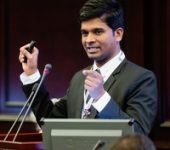 Bio: Dr. Solomon Arulraj David is an associate professor of education at the British University in Dubai. His core research interests are comparative international higher education, educational management and policy.
Bio: Dr. Solomon Arulraj David is an associate professor of education at the British University in Dubai. His core research interests are comparative international higher education, educational management and policy.
Thursday, November 3
Gino Camp
The Open University of The Netherlands
Using the Science of Learning to Inform the Design of Online Education
Abstract: How do we learn effectively? How do we teach effectively? Memory research provides valuable insights into what learning strategies are effective when students engage in self-study and what teaching strategies induce optimal learning processes in students. However, research also shows that students and teachers are often unaware of the (in)effectiveness of the strategies they use. The match between how we study and teach on the one hand, and our cognitive architecture on the other hand is a key factor that determines the quality of learning. In this talk, Gino will substantiate and exemplify this statement and discuss the implications for the design of online and blended learning.
 Bio: Gino Camp is professor by special appointment of Effective Learning at the Faculty of Educational Sciences, Open University of the Netherlands. He received his PhD in 2006 on memory research and has since then focused on research that assesses the effectiveness of particular learning and teaching strategies in education. In 2010 he received the Education Award of the Erasmus University Rotterdam and in 2017 he received a Comenius Teaching Fellowship on learning supported by ICT. He has developed training programs and digital tools to support students’ learning and he is committed to translating knowledge from lab research into practical applications and does this in face-to-face education, online, and blended learning environments.
Bio: Gino Camp is professor by special appointment of Effective Learning at the Faculty of Educational Sciences, Open University of the Netherlands. He received his PhD in 2006 on memory research and has since then focused on research that assesses the effectiveness of particular learning and teaching strategies in education. In 2010 he received the Education Award of the Erasmus University Rotterdam and in 2017 he received a Comenius Teaching Fellowship on learning supported by ICT. He has developed training programs and digital tools to support students’ learning and he is committed to translating knowledge from lab research into practical applications and does this in face-to-face education, online, and blended learning environments.
